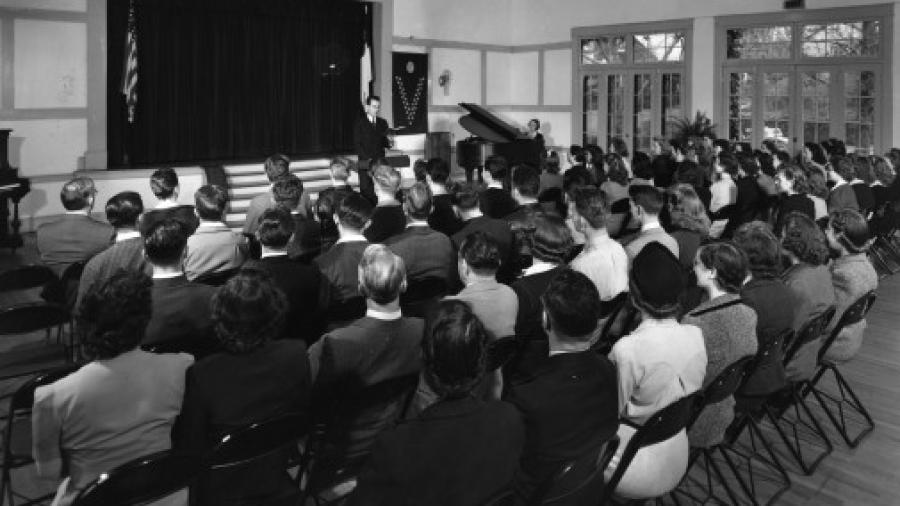Westmont Magazine An Enduring Christian Commitment

A chapel service at Westmont in Los Angeles in the 1940s.
It’s impossible to talk about Westmont without mentioning its commitment to Christianity. The founders established the college as a Christian institution, and succeeding generations of trustees, administrators and faculty have faithfully maintained this essential character. Rather than being an overlay of programs such as chapel and student ministries, Westmont’s Christian identity comes from its core, integrated into every class, activity and life. For 75 years, Westmont has faithfully proclaimed, “Christus primatum tenens; Christ holding preeminence.”
When Ruth Kerr felt God leading her to establish a school in 1937, she focused first on a Bible institute. Rev. Leland Entrekin from First Fundamental Church shared her vision, and three nationally known Bible teachers joined the faculty of the Bible Missionary Institute. The trustees soon broadened the curriculum to include junior college courses, and they embraced a liberal arts curriculum in 1940 when they founded Westmont. But they kept the Christian commitment as a central component of the college’s mission.
Burns Anderson ’40 said the new school changed his perspective. “It was broadening to find out that there was a bigger church out there in the world….school was a completely soul-changing experience for me. I woke up to the fact that you didn’t have to belong to a certain little group of people….But anyone who acknowledged Jesus Christ as Lord could be my brother.”
Margaret Bailey Jacobsen Voskuyl, a young professor, remembers meeting Trustee John Bunyan Smith. “[He] grabbed my hand, and he held it tight, and he said to me, ‘Young lady, do you subscribe to the doctrinal statement of Westmont College?’ It made me realize how deeply some of those people felt…[about] what they were founding.”
Wallace Emerson, the first president, sought to establish a Christian institution that rivaled the best secular colleges and universities in the country. Margaret Voskuyl describes his conviction, “This was to be a school that would combine faith and academic excellence for our generation. It was to be a school, not a Bible school, not a seminary, but a Christian college to develop Christian leaders, and it was a joy to be a part of something that had so much basic vision.”
The statement of purpose in Westmont’s first Quarterly Bulletin reflects Emerson’s views. “In every step which has led up to the present organization of Westmont College, the goal has been careful scholarship, sound doctrine, and consistent Christian living. Westmont College is interdenominational and evangelical, believing that genuine scholarship is not only compatible with, but necessary to, the Christian viewpoint….”
The early trustees adopted behavioral standards and a statement of faith that focused on basic Christian doctrines, and revisions of these documents continue to shape the Westmont community (see www.westmont.edu/_offices/president/statement_of_faith.html).
Over the years, the college has asserted its continued commitment to Christianity. For example, the four-week January Interterm program of the 1970s featured a class on Christian Perspectives on Learning to better acquaint students with Westmont’s mission of integrating faith and learning. The 1995 Long-Range Plan reaffirmed Westmont as an evangelical Christian liberal arts college emphasizing intellectual, spiritual and personal growth. In his 2008 inaugural address, President Gayle D. Beebe pledged his support for the college’s Christian identity and the “unrelenting commitment to academic rigor and an uncompromising emphasis on cultivating a deep love for God” that Wallace Emerson had embraced.
In 2011, Westmont created the Martin Institute for Christianity and Culture and the Dallas Willard Center for Spiritual Formation to prepare Christian leaders able to articulate the philosophical, theological and biblical rationale for developing an interactive relationship with Christ. The institute and center will help establish Christian spiritual formation as a discipline of public knowledge and encourage dialog with world Christianity and world religions, engaging scholars nationwide. The Martin Institute and Willard Center join Westmont’s many spiritual life programs and Christian liberal arts curriculum in continuing the college’s Christian identity.